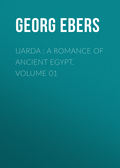
Georg Ebers
The Sisters. Volume 2
Other maidens were rejected on various grounds, and Euergetes had already proposed to send off a carrier-pigeon to Alexandria to command that some fair Greek girl should be sent by an express quadriga to Memphis—where the dark Egyptian gods and men flourish, and are more numerous than the fair race of Greeks—when Lysias exclaimed:
"I saw to-day the very girl we want, a Hebe that might have stepped out from the marble group at my father's, and have been endued with life and warmth and color by some god. Young, modest, rose and white, and just about as tall as Your Majesty. If you will allow me, I will not tell you who she is, till after I have been to our tent to fetch the gems with the copies of the marble."
"You will find them in an ivory casket at the bottom of my clothes- chest," said Publius; "here is the key."
"Make haste," cried the queen, "for we are all curious to hear where in Memphis you discovered your modest, rose and white Hebe."
CHAPTER X
An hour had slipped by with the royal party, since Lysias had quitted the company; the wine-cups had been filled and emptied many times; Eulaeus had rejoined the feasters, and the conversation had taken quite another turn, since the whole of the company were not now equally interested in the same subject; on the contrary, the two kings were discussing with Aristarchus the manuscripts of former poets and of the works of the sages, scattered throughout Greece, and the ways and means of obtaining them or of acquiring exact transcripts of them for the library of the Museum. Hierax was telling Eulaeus of the last Dionysiac festival, and of the representation of the newest comedy in Alexandria, and Eulaeus assumed the appearance—not unsuccessfully—of listening with both ears, interrupting him several times with intelligent questions, bearing directly on what he had said, while in fact his attention was exclusively directed to the queen, who had taken entire possession of the Roman Publius, telling him in a low tone of her life—which was consuming her strength—of her unsatisfied affections, and her enthusiasm for Rome and for manly vigor. As she spoke her cheeks glowed and her eyes sparkled, for the more exclusively she kept the conversation in her own hands the better she thought she was being entertained; and Publius, who was nothing less than talkative, seldom interrupted her, only insinuating a flattering word now and then when it seemed appropriate; for he remembered the advice given him by the anchorite, and was desirous of winning the good graces of Cleopatra.
In spite of his sharp ears Eulaeus could understand but little of their whispered discourse, for King Euergetes' powerful voice sounded loud above the rest of the conversation; but Eulaeus was able swiftly to supply the links between the disjointed sentences, and to grasp the general sense, at any rate, of what she was saying. The queen avoided wine, but she had the power of intoxicating herself, so to speak, with her own words, and now just as her brothers and Aristarchus were at the height of their excited and eager question and answer—she raised her cup, touched it with her lips and handed it to Publius, while at the same time she took hold of his.
The young Roman knew well enough all the significance of this hasty action; it was thus that in his own country a woman when in love was wont to exchange her cup with her lover, or an apple already bitten by her white teeth.
Publius was seized with a cold shudder—like a wanderer who carelessly pursues his way gazing up at the moon and stars, and suddenly perceives an abyss yawning; at his feet. Recollections of his mother and of her warnings against the seductive wiles of the Egyptian women, and particularly of this very woman, flashed through his mind like lightning; she was looking at him—not royally by any means, but with anxious and languishing gaze, and he would gladly have kept his eyes fixed on the ground, and have left the cup untouched; but her eye held his fast as though fettering it with ties and bonds; and to put aside the cup seemed to the most fearless son of an unconquered nation a deed too bold to be attempted. Besides, how could he possibly repay this highest favor with an affront that no woman could ever forgive—least of all a Cleopatra?
Aye, many a life's happiness is tossed away and many a sin committed, because the favor of women is a grace that does honor to every man, and that flatters him even when it is bestowed by the unloved and unworthy. For flattery is a key to the heart, and when the heart stands half open the voice of the tempter is never wanting to whisper: "You will hurt her feelings if you refuse."
These were the deliberations which passed rapidly and confusedly through the young Roman's agitated brain, as he took the queen's cup and set his lips to the same spot that hers had touched. Then, while he emptied the cup in long draughts, he felt suddenly seized by a deep aversion to the over-talkative, overdressed and capricious woman before him, who thus forced upon him favors for which he had not sued; and suddenly there rose before his soul the image, almost tangibly distinct, of the humble water- bearer; he saw Klea standing before him and looking far more queenly as, proud and repellent, she avoided his gaze, than the sovereign by his side could ever have done, though crowned with a diadem.
Cleopatra rejoiced to mark his long slow draught, for she thought the Roman meant to imply by it that he could not cease to esteem himself happy in the favor she had shown him. She did not take her eyes off him, and observed with pleasure that his color changed to red and white; nor did she notice that Eulaeus was watching, with a twinkle in his eyes, all that was going on between her and Publius. At last the Roman set down the cup, and tried with some confusion to reply to her question as to how he had liked the flavor of the wine.
"Very fine—excellent—" at last he stammered out, but he was no longer looking at Cleopatra but at Euergetes, who just then cried out loudly:
"I have thought over that passage for hours, I have given you all my reasons and have let you speak, Aristarchus, but I maintain my opinion, and whoever denies it does Homer an injustice; in this place 'siu' must be read instead of 'iu'."
Euergetes spoke so vehemently that his voice outshouted all the other guests; Publius however snatched at his words, to escape the necessity for feigning sentiments he could not feel; so he said, addressing himself half to the speaker and half to Cleopatra:
"Of what use can it be to decide whether it is one or the other—'iu' or 'siu'. I find many things justifiable in other men that are foreign to my own nature, but I never could understand how an energetic and vigorous man, a prudent sovereign and stalwart drinker—like you, Euergetes—can sit for hours over flimsy papyrus-rolls, and rack his brains to decide whether this or that in Homer should be read in one way or another."
"You exercise yourself in other things," replied Euergetes. "I consider that part of me which lies within this golden fillet as the best that I have, and I exercise my wits on the minutest and subtlest questions just as I would try the strength of my arms against the sturdiest athletes. I flung five into the sand the last time I did so, and they quake now when they see me enter the gymnasium of Timagetes. There would be no strength in the world if there were no obstacles, and no man would know that he was strong if he could meet with no resistance to overcome. I for my part seek such exercises as suit my idiosyncrasy, and if they are not to your taste I cannot help it. If you were to set these excellently dressed crayfish before a fine horse he would disdain them, and could not understand how foolish men could find anything palatable that tasted so salt. Salt, in fact, is not suited to all creatures! Men born far from the sea do not relish oysters, while I, being a gourmand, even prefer to open them myself so that they may be perfectly fresh, and mix their liquor with my wine."
"I do not like any very salt dish, and am glad to leave the opening of all marine produce to my servants," answered Publius. "Thereby I save both time and unnecessary trouble."
"Oh! I know!" cried Euergetes. "You keep Greek slaves, who must even read and write for you. Pray is there a market where I may purchase men, who, after a night of carousing, will bear our headache for us? By the shores of the Tiber you love many things better than learning."
"And thereby," added Aristarchus, "deprive yourselves of the noblest and subtlest of pleasures, for the purest enjoyment is ever that which we earn at the cost of some pains and effort."
"But all that you earn by this kind of labor," returned Publius, "is petty and unimportant. It puts me in mind of a man who removes a block of stone in the sweat of his brow only to lay it on a sparrow's feather in order that it may not be carried away by the wind."
"And what is great—and what is small?" asked Aristarchus. "Very opposite opinions on that subject may be equally true, since it depends solely on us and our feelings how things appear to us—whether cold or warm; lovely or repulsive—and when Protagoras says that 'man is the measure of all things,' that is the most acceptable of all the maxims of the Sophists; moreover the smallest matter—as you will fully appreciate —acquires an importance all the greater in proportion as the thing is perfect, of which it forms a part. If you slit the ear of a cart-horse, what does it signify? but suppose the same thing were to happen to a thoroughbred horse, a charger that you ride on to battle!
"A wrinkle or a tooth more or less in the face of a peasant woman matters little, or not at all, but it is quite different in a celebrated beauty. If you scrawl all over the face with which the coarse finger of the potter has decorated a water-jar, the injury to the wretched pot is but small, but if you scratch, only with a needle's point, that gem with the portraits of Ptolemy and Arsinoe, which clasps Cleopatra's robe round her fair throat, the richest queen will grieve as though she had suffered some serious loss.
"Now, what is there more perfect or more worthy to be treasured than the noblest works of great thinkers and great poets.
"To preserve them from injury, to purge them from the errors which, in the course of time, may have spotted their immaculate purity, this is our task; and if we do indeed raise blocks of stone it is not to weight a sparrow's feather that it may not be blown away, but to seal the door which guards a precious possession, and to preserve a gem from injury.
"The chatter of girls at a fountain is worth nothing but to be wafted away on the winds, and to be remembered by none; but can a son ever deem that one single word is unimportant which his dying father has bequeathed to him as a clue to his path in life? If you yourself were such a son, and your ear had not perfectly caught the parting counsels of the dying- how many talents of silver would you not pay to be able to supply the missing words? And what are immortal works of the great poets and thinkers but such sacred words of warning addressed, not to a single individual, but to all that are not barbarians, however many they maybe. They will elevate, instruct, and delight our descendants a thousand years hence as they do us at this day, and they, if they are not degenerate and ungrateful will be thankful to those who have devoted the best powers of their life to completing and restoring all that our mighty forefathers have said, as it must have originally stood before it was mutilated, and spoiled by carelessness and folly.
"He who, like King Euergetes, puts one syllable in Homer right, in place of a wrong one, in my opinion has done a service to succeeding generations—aye and a great service."
"What you say," replied Publius, "sounds convincing, but it is still not perfectly clear to me; no doubt because I learned at an early age to prefer deeds to words. I find it more easy to reconcile my mind to your painful and minute labors when I reflect that to you is entrusted the restoration of the literal tenor of laws, whose full meaning might be lost by a verbal error; or that wrong information might be laid before me as to one single transaction in the life of a friend or of a blood- relation, and it might lie with me to clear him of mistakes and misinterpretation."
"And what are the works of the great singers of the deeds of the heroes- of the writers of past history, but the lives of our fathers related either with veracious exactness or with poetic adornments?" cried Aristarchus. "It is to these that my king and companion in study devotes himself with particular zeal."
"When he is neither drinking, nor raving, nor governing, nor wasting his time in sacrificing and processions," interpolated Euergetes. "If I had not been a king perhaps I might have been an Aristarchus; as it is I am but half a king—since half of my kingdom belongs to you, Philometor—and but half a student; for when am I to find perfect quiet for thinking and writing? Everything, everything in me is by halves, for I, if the scale were to turn in my favor"—and here he struck his chest and his forehead, "I should be twice the man I am. I am my whole real self nowhere but at high festivals, when the wine sparkles in the cup, and bright eyes flash from beneath the brows of the flute-players of Alexandria or Cyrene— sometimes too perhaps in council when the risk is great, or when there is something vast and portentous to be done from which my brother and you others, all of you, would shrink—nay perhaps even the Roman. Aye! so it is—and you will learn to know it."
Euergetes had roared rather than spoken the last words; his cheeks were flushed, his eyes rolled, while he took from his head both the garland of flowers and the golden fillet, and once more pushed his fingers through his hair.
His sister covered her ears with her hands, and said: "You positively hurt me! As no one is contradicting you, and you, as a man of culture, are not accustomed to add force to your assertions, like the Scythians, by speaking in a loud tone, you would do well to save your metallic voice for the further speech with which it is to be hoped you will presently favor us. We have had to bow more than once already to the strength of which you boast—but now, at a merry feast, we will not think of that, but rather continue the conversation which entertained us, and which had begun so well. This eager defence of the interests which most delight the best of the Hellenes in Alexandria may perhaps result in infusing into the mind of our friend Publius Scipio—and through him into that of many young Romans—a proper esteem for a line of intellectual effort which he could not have condemned had he not failed to understand it perfectly.
"Very often some striking poetical turn given to a subject makes it, all at once, clear to our comprehension, even when long and learned disquisitions have failed; and I am acquainted with such an one, written by an anonymous author, and which may please you—and you too, Aristarchus. It epitomizes very happily the subject of our discussion. The lines run as follows:
"Behold, the puny Child of Man
Sits by Time's boundless sea,
And gathers in his feeble hand
Drops of Eternity.
"He overhears some broken words
Of whispered mystery
He writes them in a tiny book
And calls it 'History!'
"We owe these verses to an accomplished friend; another has amplified the idea by adding the two that follow:
"If indeed the puny Child of Man
Had not gathered drops from that wide sea,
Those small deeds that fill his little span
Had been lost in dumb Eternity.
"Feeble is his hand, and yet it dare
Seize some drops of that perennial stream;
As they fall they catch a transient gleam—
Lo! Eternity is mirrored there!
"What are we all but puny children? And those of us who gather up the drops surely deserve our esteem no less than those who spend their lives on the shore of that great ocean in mere play and strife—"
"And love," threw in Eulaeus in a low voice, as he glanced towards Publius.
"Your poet's verses are pretty and appropriate," Aristarchus now said, "and I am very happy to find myself compared to the children who catch the falling drops. There was a time—which came to an end, alas! with the great Aristotle—when there were men among the Greeks, who fed the ocean of which you speak with new tributaries; for the gods had bestowed on them the power of opening new sources, like the magician Moses, of whom Onias, the Jew, was lately telling us, and whose history I have read in the sacred books of the Hebrews. He, it is true—Moses I mean—only struck water from the rock for the use of the body, while to our philosophers and poets we owe inexhaustible springs to refresh the mind and soul. The time is now past which gave birth to such divine and creative spirits; as your majesties' forefathers recognized full well when they founded the Museum of Alexandria and the Library, of which I am one of the guardians, and which I may boast of having completed with your gracious assistance. When Ptolemy Soter first created the Museum in Alexandria the works of the greatest period could receive no additions in the form of modern writings of the highest class; but he set us—children of man, gathering the drops—the task of collecting and of sifting them, of eliminating errors in them—and I think we have proved ourselves equal to this task.
"It has been said that it is no less difficult to keep a fortune than to deserve it; and so perhaps we, who are merely 'keepers' may nevertheless make some credit—all the more because we have been able to arrange the wealth we found under hand, to work it profitably, to apply it well, to elucidate it, and to make it available. When anything new is created by one of our circle we always link it on to the old; and in many departments we have indeed even succeeded in soaring above the ancients, particularly in that of the experimental sciences. The sublime intelligence of our forefathers commanded a broad horizon—our narrower vision sees more clearly the objects that lie close to us. We have discovered the sure path for all intellectual labor, the true scientific method; and an observant study of things as they are, succeeds better with us than it did with our predecessors. Hence it follows that in the provinces of the natural sciences, in mathematics, astronomy, mechanics and geography the sages of our college have produced works of unsurpassed merit. Indeed the industry of my associates—"
"Is very great," cried Euergetes. "But they stir up such a dust that all free-thought is choked, and because they value quantity above all things in the results they obtain, they neglect to sift what is great from what is small; and so Publius Scipio and others like him, who shrug their shoulders over the labors of the learned, find cause enough to laugh in their faces. Out of every four of you I should dearly like to set three to some handicraft, and I shall do it too, one of these days—I shall do it, and turn them and all their miserable paraphernalia out of the Museum, and out of my capital. They may take refuge with you, Philometor, you who marvel at everything you cannot do yourself, who are always delighted to possess what I reject, and to make much of those whom I condemn—and Cleopatra I dare say will play the harp, in honor of their entering Memphis."







